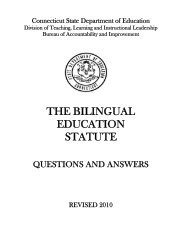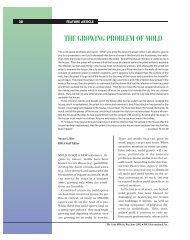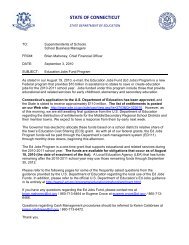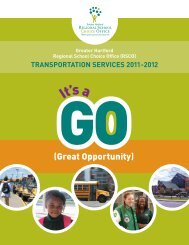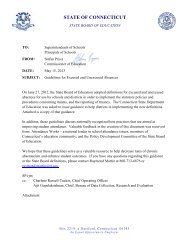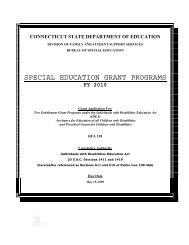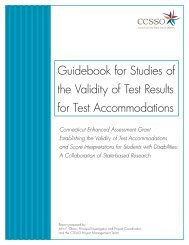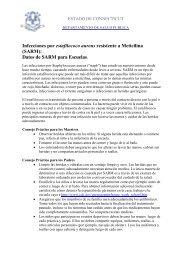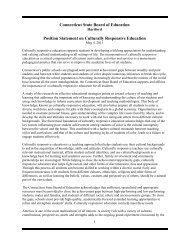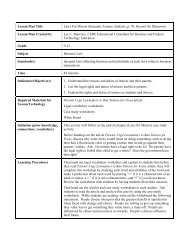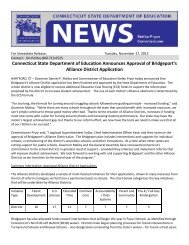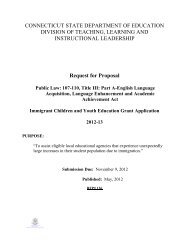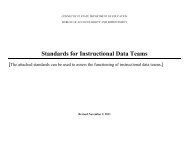Early Childhood - Connecticut State Department of Education
Early Childhood - Connecticut State Department of Education
Early Childhood - Connecticut State Department of Education
Create successful ePaper yourself
Turn your PDF publications into a flip-book with our unique Google optimized e-Paper software.
Social-Emotional Competence and Family Relations Chapter 10<br />
SOCIAL-EMOTIONAL DEVELOPMENT<br />
IN THE FAMILY<br />
While children are developing as individuals and as<br />
members <strong>of</strong> a group, they are immersed in learning the<br />
social rules and values <strong>of</strong> their cultures and families.<br />
Ethnicity, race, religion, region, social class, gender, sexual<br />
orientation and physical abilities make up some <strong>of</strong><br />
the dimensions <strong>of</strong> the human experience that we know<br />
as culture.<br />
The customs, traditions and values <strong>of</strong> children’s<br />
families and cultures shape and influence their classroom<br />
experiences. Culture affects how we communicate with<br />
each other. We interpret all we see or hear through the<br />
lens <strong>of</strong> our own beliefs, values and experiences. It is common<br />
to misinterpret or misunderstand the communication<br />
style <strong>of</strong> someone from another culture. Each culture<br />
has its own defined communication system, including<br />
actions, gestures, words, postures, facial expressions,<br />
tones <strong>of</strong> voice, and ways <strong>of</strong> handling time, space, materials,<br />
work and play. Children learn the rules and norms<br />
for communicating and interacting from their families.<br />
Cultivating a deeper understanding <strong>of</strong> children<br />
in the context <strong>of</strong> their family cultures may prevent misunderstandings.<br />
Teachers must take into account family<br />
values regarding behaviors and rules, and develop<br />
an understanding <strong>of</strong> how relationships with adults in<br />
authority are perceived in various cultures. These expectations<br />
affect the child’s responses within the classroom,<br />
and misunderstandings can create confusion and<br />
discomfort. For example, certain cultures frown upon<br />
children looking directly at an adult during a conversation.<br />
Others encourage dependence on adults, for example,<br />
in feeding or decision making, beyond Western expectations.<br />
Teachers who understand children’s home<br />
cultures are able to more fully understand their learning<br />
needs, and are better able to make all children feel<br />
safe and supported in the classroom. The importance <strong>of</strong><br />
family relations is addressed in the next section.<br />
FAMILY RELATIONS<br />
<strong>Early</strong> childhood teachers play an especially important<br />
family support role. By building relationships with<br />
parents and other significant adults in their students’<br />
lives, teachers contribute to the creation <strong>of</strong> safe and<br />
healthy learning environments for children. The<br />
ultimate goal is for the significant adults in each child’s<br />
life to work together more effectively as partners to<br />
promote the child’s development and learning.<br />
This type <strong>of</strong> partnership must reflect the<br />
different roles, attitudes and needs in multiracial and<br />
socioeconomically diverse populations. In a partnership,<br />
all partners share rights and responsibilities, power and<br />
decision making, and mutual trust and respect. Schools<br />
have long sought parental involvement. Using the term<br />
137<br />
partnership rather than involvement captures the idea<br />
<strong>of</strong> shared responsibility for children across the three<br />
contexts <strong>of</strong> home, school and community.<br />
In recognition <strong>of</strong> the importance <strong>of</strong> partnerships<br />
that support early learning the <strong>Connecticut</strong> <strong>State</strong> Board<br />
<strong>of</strong> <strong>Education</strong> adopted a Position <strong>State</strong>ment On School-<br />
Family-Community Partnerships in August 1997. A<br />
“Guide to Using the Position <strong>State</strong>ment” explains the<br />
role <strong>of</strong> early care and education in fostering socialemotional<br />
development as follows:<br />
A Role For <strong>Early</strong> Care<br />
And <strong>Education</strong> Programs<br />
Every early care and education program<br />
can develop effective strategies to<br />
involve all families in the education<br />
<strong>of</strong> their children. Partnerships with<br />
parents have been a primary focus<br />
<strong>of</strong> the early care and education field<br />
since its inception. However, based on<br />
national surveys, families indicate that<br />
they would like more information and<br />
opportunities to be actively engaged<br />
in their child’s education. <strong>Early</strong> care<br />
and education programs can <strong>of</strong>fer<br />
a comprehensive school-familycommunity<br />
partnership program that<br />
makes some connection with all families.<br />
Not all families can take advantage<br />
<strong>of</strong> all partnership activities, but every<br />
family can be involved in some way.<br />
<strong>Early</strong> care and education programs<br />
can provide training and support to<br />
staff and administrators in the areas <strong>of</strong><br />
setting partnership goals and effective<br />
practices as well as strategies for<br />
monitoring progress to learn which<br />
practices are most successful.<br />
Because early childhood educators<br />
have a holistic view <strong>of</strong> young children,<br />
they are uniquely positioned to assist<br />
families in connecting to resources<br />
in the community. To make these<br />
connections, early childhood educators<br />
can become knowledgeable about<br />
community resources by contacting local<br />
organizations and state information<br />
sources such as Infoline (available<br />
by dialing 211). Finding out about<br />
community resources that are available<br />
to families is the first step. Bringing the<br />
needs <strong>of</strong> young children and families to<br />
the attention <strong>of</strong> the wider community is<br />
the next step. <strong>Early</strong> childhood educators



